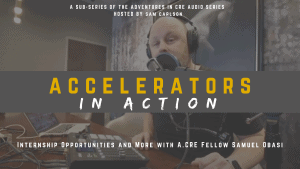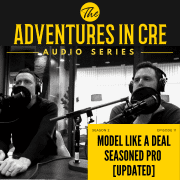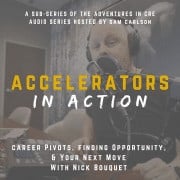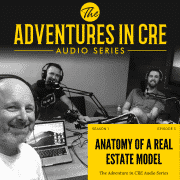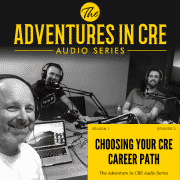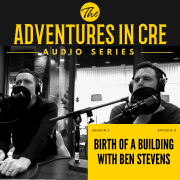Internship Opportunities and More with A.CRE Fellow Samuel Obasi – AiA
In this episode of Accelerators in Action, we’re so happy to feature Samuel Obasi, the current A.CRE Fellow. In this episode, we talk about the opportunities that come with a Fellowship as well as internships and so-on.
This is our 9th episode in a growing sub-series of interviews with commercial real estate professionals. This Accelerators in Action sub-series tells the stories of CRE professionals at all stages of their career, from students to senior-level professionals. Their experiences will provide you with insights into how to take your real estate career to the next level.
Listen to this Episode – Internship Opportunities and More with A.CRE Fellow Samuel Obasi
Resources from this Episode
- Adventures in CRE: https://www.adventuresincre.com/
- View our CRE Career Resources: https://www.adventuresincre.com/careers/
- A.CRE Accelerator: https://www.adventuresincre.com/accelerator/
Episode Transcript – Internship Opportunities and More with A.CRE Fellow Samuel Obasi
Announcer (00:02):
Making your mark in commercial real estate is a journey best travel with grit, determination, and a mindset to take action. To most, success at the highest levels is a fleeting thought than unrealistic expectation. But to others, opportunity boils down to focus, preparation, and a lifelong commitment to learning and improvement. Join me as I take you into the lives of those unwilling to leave their success to chance, and instead take complete control of their futures. These are action taking, limit breaking, never faking, Accelerators in Action.
Sam Carlson (00:39):
All right. What is up everybody? Welcome back to Accelerators in Action. It’s been a little while since we did one of these. I’m excited to be here today with our guest. And actually, I’m hosting as well as co-hosting with my good buddy, Michael Belasco.
Michael Belasco (00:54):
Great to be here as a co-host on this.
Sam Carlson (00:56):
Yeah, man. No, we’re excited. So I’ve got Michael Belasco here for an important reason. A lot of times when I do Accelerators in Action it’s a highlight on people who have gone through The Accelerator and are really doing cool and interesting things. And today is no exception. But it’s a little bit different context. So about, oh, I don’t know, four or five months ago, Michael, maybe I’m fuzzy on the timeframe. But about four or five months ago, [Crenn 00:01:25] reached out to us and they’re in … What is it called? Real Estate Association Network?
Michael Belasco (01:31):
Collegiate Real Estate Network.
Sam Carlson (01:32):
Okay. Collegiate. Cool. So they reached out to us and we were talking about all the cool things that they were doing within their group. And we talked about the best ways to collaborate. And one of the things we came up with was the A.CRE internship. Right, Michael?
Michael Belasco (01:50):
That’s correct.
Sam Carlson (01:51):
Yeah.
Michael Belasco (01:52):
Fellowship.
Sam Carlson (01:52):
Oh, fellowship. That’s right. So, Michael, before we introduce our guest here, maybe tell us a little bit about the A.CRE fellowship, what we’re doing, and the underlying goal of that.
Michael Belasco (02:07):
Yeah. So it’s a paid fellowship. And we take on an undergrad each semester and we hope to continue this and it’s through the Collegiate Real Estate Network. And the goal is really to help students who are aspiring to get into real estate that show a ton of promise, exposure, get them some networking contacts, and allow them to produce content to be featured on our website, and just generally help them get plugged in and get better prepared.
Michael Belasco (02:36):
So we thought it was a naturally a really good fit with Crenn and so we offered that. And Samuel happened to be our first. So he’s the very first A.CRE fellow. And so, we’re really excited to have him. He’s a really great, interesting background. And he’s looking to do great things. And again, Samuel is a junior studying finance from Telson. And he’s like many juniors are exploring the whole world of commercial real estate. He had a lot of really good ideas and interesting ideas. And we are excited to see what he produces going forward here. So, we’re very excited to have him on board. And we look forward to watching him as he grows within the commercial real estate industry.
Sam Carlson (03:22):
Yes. Absolutely. Well, I guess we’ll introduce our guest and the first A.CRE fellow, Samuel Obasi. Samuel, how are you doing buddy?
Samuel Obasi (03:32):
I’m great. Thank you, Sam and Michael for having me.
Sam Carlson (03:35):
Yeah. Yeah. So you go by Samuel, right?
Samuel Obasi (03:39):
I go by either one. But most of my friends just call me Sam.
Sam Carlson (03:42):
Okay. Well, we’ll call you Samuel so we don’t get all confused here. There’s not usually two of my names walking around the place. But anyway. So yeah, I mean, we were really impressed with you. We want to jump into your background and learn what it was that brought you … Like first, what was the first thing that said, “Oh, let’s apply for that fellowship”? And then we’ll jump into your background. Let’s start with why did you decide to take on this fellowship?
Samuel Obasi (04:15):
Definitely. So, why I decided to take on the fellowship honestly was because I had already heard about A.CRE through, I guess, you could call it like someone I looked to as a mentor in the commercial real estate industry. And he was already telling me that’s something that I need to purchase prior to starting my summer internship for this upcoming summer. So it was something that I was already planning on purchasing or doing it sometime in the spring time when I had some free time.
Samuel Obasi (04:44):
So when I saw Crenn put it in our group chat that we would be collabing with you I said this is a perfect opportunity. I’d be getting not only to do all the other things that the program and the fellowship offers, but I will also be getting to go through the entire accelerator for basically free and get paid for it. So, it was a no-brainer at that point.
Sam Carlson (05:06):
Yeah. It’s basic arithmetic, right? Well, no, it’s cool. Like we’ve got a lot of … The Accelerator is great for a lot of different folks. And we have a ton of students, obviously, that are coming in at different phases of their career. So it’s awesome for that. But take me back before commercial real estate. First of all, where are you from, some of your background. And then what was it that said, “Hey, let’s get into commercial real estate”? Where did that all kind of start?
Samuel Obasi (05:34):
Definitely. I guess my background originally, my family immigrated from Nigeria. Although I was born in United States, I’ve been back plenty of times. But I grew up in Prince George’s County, Maryland. It’s a suburb, large suburb outside of Washington, DC. In that suburb, it’s divided. It’s a lot of people hear about one side, but it’s divided into like two sides of, I would say, the wealth or like the demographics like the barrier where it’s like one side is closer to the inner city part of DC. People look at it as like the less wealthier side and the other side is like the wealthy side that everyone knows about.
Samuel Obasi (06:10):
So I grew up on the other side, so the side that was a little less wealthy. And at first I was not interested in commercial real estate, but that’s because I didn’t know about it. Honestly, just like a lot of students that you might talk to just don’t know what industry. I knew about real estate as in like flipping residential homes, or buying rental properties, stuff like that. Things like that. I knew that and I was always interested in getting into that. But I never knew that … I don’t know.
Samuel Obasi (06:35):
I just never thought like people bought actual buildings, office buildings, retail buildings, stuff like that up until I think I was like 18, 19 when I was my freshman year of college. I was through different diversity programs that I was in such as SCO, MLT. And then I found a friend of my sophomore year. That’s how I found out about it, commercial real estate. Because at that time, I was still, just in general, finance person interested in investment banking, private equity, stuff like that.
Samuel Obasi (07:05):
It was my last internship for last summer. I interned at Artemis. I did the summer enrichment program. That was really like owned in that I really wanted to be in the commercial real estate industry just because of the speakers that they had speak to us, just the things that they were talking to us about. I enjoyed. I felt like it came easy to me. We were just doing the financial modeling. When we were underwriting deals, I just felt like this was something that it was exciting. It didn’t feel like work to me.
Samuel Obasi (07:33):
So I was like, “If finance doesn’t feel like work to you, that’s definitely what you have to do,” right? Because a lot of people that like my age, they pursue careers in finance usually for the money. But I felt like this was something that I could do. I didn’t mind spending hours and hours doing it. So I was like, “I mean, this makes sense.” So that’s how I got to where I’m at now.
Sam Carlson (07:53):
Yeah.
Michael Belasco (07:54):
I love that. It’s funny how … You hit on two things. Most people don’t realize what commercial real estate is, right? It’s like you’re either the developer or you’re a broker. People don’t know what it takes and how many people are involved just to get one building up off the ground. So it’s a massive industry. There’s a lot of job opportunity there.
Michael Belasco (08:16):
And the other thing you hit on, which is important to me, and I think means to a lot of people in the industry is that it doesn’t feel like work to so many people. Most of the people that enter into commercial real estate end up staying here. The diversity in backgrounds, like the industry where people are coming from. You hear people coming into real estate from a lot of … Like you’ll see in the background I have guitars. I was like an urban musician. Got into construction because I wanted to play music. And it was like a part-time thing.
Michael Belasco (08:41):
But I found real estate and the built environment felt like music to me in a lot of ways. And there’s that synergy. So you hit it on the head when you said it doesn’t feel like work, but it’s like there’s a lot of opportunity and there’s a lot of money to be made. And it’s just a fun thing to do. So this is great answers I wanted to add onto that comment.
Sam Carlson (09:02):
You know, it’s interesting because … I don’t remember. Maybe, Michael, you remember. I don’t know if you do. But how many people applied for the fellowship? Do you remember? It was a lot.
Michael Belasco (09:13):
I don’t actually remember. I don’t remember who some of the members were.
Sam Carlson (09:18):
But when we’re looking at these different personalities and profiles, we’re looking for something that is not … It’s not necessarily like objective like, “We want this much experience.” It’s nothing along those lines. It’s always the fabric. Like, what shows character? I heard this quote one time where it’s like getting rich quick builds ego. Getting rich quick slow builds character. Right? And whether it’s getting rich, getting rich as is a monetary thing. But getting successful, like achieving success fast builds ego. But building slow and learning how to really strategize and think through and overcome is a skillset.
Sam Carlson (10:08):
So, I want to talk … I mean, as far as getting into commercial real estate and getting to where you’re at now, you’re a junior in college. And let’s talk about some of like … Has it been smooth sailing? Or what were some of the obstacles that really maybe got in your way? And I want to ask this for a couple of reasons. One, I remember when I was in college. In college, when you’re in college, it seems like it’s lasting forever. At least that’s what it was like for me. I don’t know if it was like that for you guys. Right?
Sam Carlson (10:41):
And then when you get out, then I was like, “Man, that was just a blip on the radar.” And everything that happened in my past was, again, just a blip on the radar. So talk to us about some of the challenges of getting into the program, where you’re at, and some of those things about your background, if you wouldn’t mind.
Samuel Obasi (10:58):
Definitely. I mean, I’m still facing a few challenges now. But it was a lot more difficult for me just my freshman and sophomore year. Just because I knew I wanted to pursue a career in finance prior to getting to college. But I guess, I don’t want to say no one told me because, obviously, these are just things that somebody’s supposed to know. But I didn’t realize how hard it is to break into a career like something like this, especially from the school that I go to. Because the school that I go to, it’s like we’re not known for producing people to go into CRE, or investment bankers, just high prestigious like finance career and stuff like that.
Samuel Obasi (11:39):
So when I first got to college, my GPA I think it was like a 3.0 flat. And that’s not the GPA that you would need to get these prestigious internships and stuff like that. So my sophomore year, I struggled a lot with different going through the application process, and getting rejected, not getting interviews just because of some of these factors. At first, I actually had an internship. I had finally found an internship. I was going to be a property management summer analyst at one of the firms in the local Washington DC area.
Samuel Obasi (12:10):
But then COVID hit and then I lost that internship. They just canceled and then that was done. And then that was like a huge challenge just because I’m left with no internship my sophomore year. Like, how am I going to go into my junior year when I’m interviewing? Firms want to see that you have some type of relevant experience and things like that.
Samuel Obasi (12:28):
So, I mean, that was a difficult time. I’m not going to lie. I didn’t know what to do. There was some days I just sat and just sorrowfully. I didn’t know what to do. But I mean, what I realized at that point was that I couldn’t just sit around and do nothing. I had to take my destiny in my own hands at that point just start reaching out to as many people as I knew.
Samuel Obasi (12:48):
So I ended up reaching out to a friend that attends a different university, local university. And he told me, because he’s also interested in commercial real estate. And then he told me about a program that Artemis was doing, summer enrichment program. They reopened applications for the summer due to a lot of students losing their internships at whatever firms they were at. So I used that as an opportunity. I emailed the recruiter there. And from there, I got the interview and then ended up getting into the enrichment program for last summer.
Samuel Obasi (13:23):
And that skyrocketed my career, I guess. Oh, I mean my early career in commercial real estate just due to the fact that the people that we were exposed to throughout the summer, because that isn’t necessarily internship. It’s more like an educational program. That’s the way I like to look at it. Because in that program, they had us speak with people from brokerage. We spoke with institutional acquisitions people, development, all types of people across the entire industry.
Samuel Obasi (13:50):
And also, got to break down on the different like how to construct a proforma. Things that I didn’t know prior. And that definitely helped me get the internship that I’ll have for this summer. Just going through the interview process I could articulate certain things about the commercial real estate industry that I wasn’t able to do prior. So, that was a huge challenge that I had to go through my sophomore year.
Sam Carlson (14:14):
That’s awesome.
Michael Belasco (14:16):
Yeah. That’s like there’s this roomy story, who knows what is good or bad? I won’t go into the story, but it’s basically like something bad happens. And you always ask the question like, “Who knows what’s good or bad?” You end up getting this much … I don’t know if it’s much better opportunity. But this opportunity certainly exposed you to a lot more. And that’s basically you saying, “I’m not going to stop here.” And [inaudible 00:14:39] can say, “I lost that and that’s it. And that’s my story going forward. Well, I had an internship but I lost.” It’s like, “No, you’re going to get up and keep going.” That’s great. So, I want to shift a little bit, Sam, if you’ll allow me to-
Sam Carlson (14:51):
Absolutely.
Michael Belasco (14:52):
… look forward here now. So commercial real estate interests you. Obviously, you love the finance piece of it and you’re enjoying it. What do you see for yourself going forward? What are some topics or ideas in commercial real estate that interest you? And they don’t need to be super big. I’m just curious, what is in your mind? Like what are you thinking about with real estate going forward and how you see yourself within it?
Samuel Obasi (15:22):
So career-wise, or just like different topics that interest me?
Michael Belasco (15:26):
Different topics that interests you.
Samuel Obasi (15:28):
I would say definitely the top three that go through my head constantly the first one would be the redevelopment of tertiary nations. So like I said, my family comes from Nigeria. And although there are some primary parts of Nigeria, majority of the nation is very underdeveloped. And I know there’s some developments that are happening there right now. But that’s something that I’m definitely interested in just to see how companies or how individuals are just going to make use of some of the resources to redevelop or just overall ground of development in those areas.
Samuel Obasi (16:03):
The second would be adaptive reuse of a lot of the retail properties or that, I guess, went under during COVID during this e-commerce boom. Like I know some companies are purchasing distress retail assets just to renovate them to turn them to, I don’t know, high-end condos, multi-family standard and stuff like that just to see how that’s going to work. And also, just retail again.
Samuel Obasi (16:29):
I’m just really interested in how retail is going to fair after all of this. Obviously, I feel like people exaggerate the whole Amazon thing. Like no one is ever going to not want to go to the mall. But what, I guess, what stores at the mall can outlast this? Because I know we all know a lot of the stores that went bankrupt, went under stuff like that. To just see what companies can outlast this COVID and e-commerce boom. That’s something I’m just really interested in to look at.
Michael Belasco (16:57):
Is it fair to say that these are some teasers into some of the content you might be producing for us? Just more deep dive into that?
Samuel Obasi (17:05):
Definitely.
Michael Belasco (17:05):
Awesome. Awesome.
Sam Carlson (17:06):
So Michael, talk a little bit about what … So this content that Samuel will be creating, talk about how he … Obviously, a lot of this will be originating from him. But how does the fellowship actually work? What does that look like with our team? And what’s our goal? I guess, what’s the goal with the fellowship?
Michael Belasco (17:29):
Yeah. The goal is twofold, I think. One is to really help in any way we can with whoever the fellow is to get them to where they want to go. We can be any part of a stepping stone to get them there. So, Samuel’s ideas, for us to be able to facilitate … It’s funny I just met somebody through work whose father is a real estate professor in Nigeria. It’s funny that this is one of your topics. And I just met this person last week, actually. So I already know if we’re going to be doing something like that there’s going to be a contact there.
Michael Belasco (18:07):
So our goal is to help the fellows network, get them to think really, or facilitate their really good ideas and help them to produce great content that then gets put on a venture. It has their name tied to it. Helps them grow. Give them something to point to. Because when you’re going through undergrad, you get a lot of good experience through school. But there’s a lot more you can do to help fill out your resume and show that you’re engaged.
Michael Belasco (18:35):
So part of that is real. Actually, that’s really the main point is to help whoever the fellow is push up into the next level of their career, help them network, and help them think about how to take next steps into whatever their creative ideas are. And so you heard Samuel. And he’s in perfect step for being in undergrad and thinking broadly. Like that was a broad list of really compelling and interesting ideas and being able to help him explore that.
Michael Belasco (19:03):
And then we get a ton of value from that too. Because as we get older, we get pigeonholed into our spaces. And then when we bring fellows in, it’s like all of these new ideas that they’re fresh with and we get to learn and hear from them. So it’s an exchange. We hope to get a lot from them and stay in touch and stick with the network of up-and-coming real estate professionals. And then, hopefully, give back [inaudible 00:19:25].
Michael Belasco (19:25):
And you know, the way we do that is, again, we have a schedule we’re setting up now with Samuel where he’s going to produce ideas we’ll work on. We’ll connect them with people to help him write his articles. Not write them, but he can interview people. He can help them find research ideas. And then we go through. We’ll look at drafts together and we’ll get them up online. So, we hope it’s a huge net benefit to whoever our fellow is that comes through in a year. And they get The Accelerator and they get to go through that program, which we think obviously is an amazing opportunity to learn essentially what you really need to know coming out as an analyst and associate. So we hope that all of that is a tremendous value add all around.
Sam Carlson (20:09):
And let’s shift over to you, Samuel. I mean, we’re really just beginning to take you through this fellow as our first fellow and you’re working with our team. You’ve got Michael and Kyle and Spencer and folks that you’ll be working with. What do you hope to get out of this? What is some of the things that you’re excited for? What are you looking forward to? And what do you look forward to in the future?
Samuel Obasi (20:37):
Definitely. I would say just everything that’s already been laid out, honestly. Just being able to connect with industry professionals, people that are experts in some of the topics that I’m interested in and just picking their brains, having conversations with them. The amount of things that you can learn from just one conversation with an industry expert, it surpasses a thousand Google searches. So just stuff like that that’s definitely something that I’m definitely looking forward to.
Sam Carlson (21:03):
Yeah. No, it’s exciting. And I think just in summary for anybody that’s listening, the Accelerators in Action is always about initiative taking action, thinking creatively. Basically, the antithesis of what most people do when they try and … I mean, there’s one thing about having ambition for the future. There’s another thing of implementing and taking action on that. So, I’m glad we’ve been able to do this and really introduce you, Samuel, to our audience because I think a lot of people are going to have fun following your journey, reading some of your content.
Sam Carlson (21:42):
And on our end, we’re excited to really start seeing folks take that initiative. Right? And that’s where we saw your story. We said, “Man, let’s be another part of this journey.” So we’re excited to have you. Thanks for coming on. And to the listeners, thanks for listening. And we’ll see you on the next episode.
Announcer (22:09):
Thank you for tuning in to this episode of Accelerators in Action. For show notes and additional resources, head over to www.adventuresincre.com/audioseries. Would you like to learn real estate financial modeling in a matter of weeks and do it with zero guesswork? If so, the A.CRE Accelerator is for you. The Accelerator is a step-by-step case-based program designed to teach you exactly what you need to know and in the order you need to know it so you can gain both the knowledge and experience to take your career to the next level. To see if the Accelerator is right for you, go to www.adventuresincre.com/accelerator.

